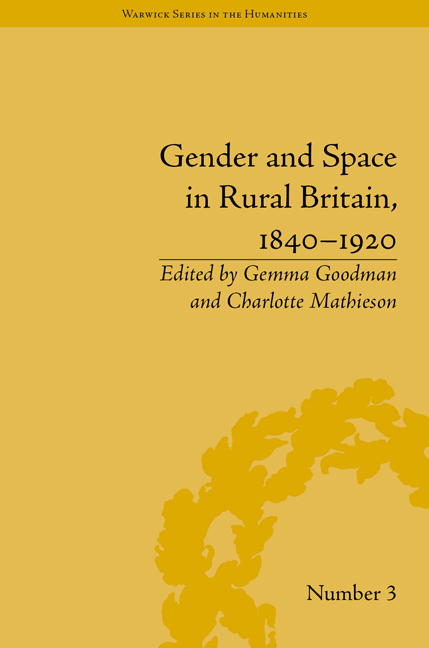Book contents
- Frontmatter
- Contents
- Acknowledgements
- List of Contributors
- Introduction: Gender and Space in Rural Britain, 1840–1920
- 1 Women in the Field
- 2 ‘Between Two Civilizations’: George Sturt's Constructions of Loss and Change in Village Life
- 3 At Work and at Play: Charles Lee's Cynthia in the West
- 4 ‘Going Out, Going Alone’: Modern Subjectivities in Rural Scotland, 1900–21
- 5 ‘Drowned Lands’: Charles Kingsley's Hereward the Wake and the Masculation of the English Fens
- 6 ‘Wandering Like a Wild Thing’: Rurality, Women and Walking in George Eliot's Adam Bede and The Mill on the Floss
- 7 ‘I Never Liked Long Walks’: Gender, Nature and Jane Eyre's Rural Wandering
- 8 Gertrude Jekyll: Cultivating the Gendered Space of the Victorian Garden for Professional Success
- 9 From England to Eden: Gardens, Gender and Knowledge in Virginia Woolf's The Voyage Out
- 10 The Transnational Rural in Alicia Little's My Diary in a Chinese Farm
- Notes
- Index
2 - ‘Between Two Civilizations’: George Sturt's Constructions of Loss and Change in Village Life
- Frontmatter
- Contents
- Acknowledgements
- List of Contributors
- Introduction: Gender and Space in Rural Britain, 1840–1920
- 1 Women in the Field
- 2 ‘Between Two Civilizations’: George Sturt's Constructions of Loss and Change in Village Life
- 3 At Work and at Play: Charles Lee's Cynthia in the West
- 4 ‘Going Out, Going Alone’: Modern Subjectivities in Rural Scotland, 1900–21
- 5 ‘Drowned Lands’: Charles Kingsley's Hereward the Wake and the Masculation of the English Fens
- 6 ‘Wandering Like a Wild Thing’: Rurality, Women and Walking in George Eliot's Adam Bede and The Mill on the Floss
- 7 ‘I Never Liked Long Walks’: Gender, Nature and Jane Eyre's Rural Wandering
- 8 Gertrude Jekyll: Cultivating the Gendered Space of the Victorian Garden for Professional Success
- 9 From England to Eden: Gardens, Gender and Knowledge in Virginia Woolf's The Voyage Out
- 10 The Transnational Rural in Alicia Little's My Diary in a Chinese Farm
- Notes
- Index
Summary
In Change in the Village (1912) George Sturt writes of a young man who, he believes, soon after leaving school, probably found employment as a gravel-digger before becoming a night repairman on the railway until a chill contracted at work turned to bronchitis and pleurisy and nearly killed him. Unemployment would have forced him back to the same job had he not secured work as a coal-carter. Sturt expects that he will remain a coal-carter indefinitely, and acknowledges that it is ‘more useful by far – to the community – than the old industries were wont to be’. However, since the work itself, he claims, requires little skill or knowledge, it provides no opportunities for the man to broaden his mind. Sturt imagines, on the one hand, that he will have to suppress ‘the zest and fascination of living, with the senses alert, the tastes awake, and manifold sights and sounds appealing to his happy recognition’ until his brief leisure hours; and, on the other, that he will be so exhausted by his labours that he will have no energy to ‘even begin to refresh himself with the arts, or even the games, of civilization’. Worse still, he opines, in contrast with another exemplary figure, an elderly village labourer who has preferred the freedom of casual employment to the servitude of regulated work, the carter has no memories or experience of the variety of ‘rural activities, changeful, accomplished, carried on by many forms of skill and directed by a vast amount of traditional wisdom, whereby the country people of England had for ages supported themselves in their quiet valleys’.
- Type
- Chapter
- Information
- Gender and Space in Rural Britain, 1840–1920 , pp. 25 - 40Publisher: Pickering & ChattoFirst published in: 2014



